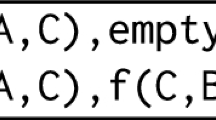Abstract
The main goal is to exhibit the relationship between research work on non-monotonic reasoning and recursion-theoretically based approaches to inductive learning. There are introduced the concepts of monotonic and weakly monotonic inductive inference. It is proved that these concepts are considerably distinguished from other classical concepts of inductive inference, i.e. non-monotonic reasoning is inherently required in several approaches to inductive inference.
Similar content being viewed by others
Explore related subjects
Discover the latest articles, news and stories from top researchers in related subjects.References
D. Angluin and C.H. Smith. A Survey of Inductive Inference: Theory and Methods.Computing Surveys, 15, 1983, 237–269.
K.P. Jantke. Algorithmic Learning from Incomplete Information: Principles and Problems. In J. Dassow and J. Kelemen, editors,Machines, Languages, and Complexity, Lecture Notes in Computer Science 381. Springer-Verlag, 1989, 188–207.
K.P. Jantke and H.R. Beick. Combining Postulates of Naturalness in Inductive Inference.EIK, 17, 1981, 465–484.
E.Y. Shapiro. Inductive Inference of Theories form Facts. InResearch Report 192. Yale University, 1981.
Author information
Authors and Affiliations
About this article
Cite this article
Jantke, K.P. Monotonic and non-monotonic inductive inference. NGCO 8, 349–360 (1991). https://doi.org/10.1007/BF03037092
Received:
Issue Date:
DOI: https://doi.org/10.1007/BF03037092




